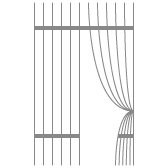|
“One minute left!” I yell out to the 25 guys in the gym. I’m pushing them — and myself — to keep up the crushing pace of our burpees until we feel that elusive burn inside our chest and shoulders.
On this July afternoon, it’s 95 degrees outside, but it feels like 100-plus inside this barren box we call a gym. There’s no A.C. or even a fan blowing. There are no lights on, and the windows are near the ceiling, so the daylight barely finds us. The basketball goals are cranked up to the rafters and the bleachers are flipped up against the walls. As the last man lifts himself up off the floor, gasping for air, I yell out, “One-minute break!” The guys make their way to the water fountain in a hurry.
This isn’t a scene from your local high-school gym. We are 26 men living in FCI Allenwood, a federal prison in Pennsylvania. We are, without question, physically fit, but America has deemed us unfit to be free.
The United States of America incarcerates more people per capita, and at a higher rate than any other country in the world. In exchange for capital gain, our country is complicit in creating habitats of bad health. Heart attacks, hypertension, diabetes and strokes stalk prison yards, sometimes outnumbering blades of grass.
State and federal court systems are full of lawsuits by and on behalf of incarcerated people suffering from poor or nonexistent health care. Often, our only defense against prison's oppressive operations is exercise. We must get fit to live. It’s a matter of both physical and mental health.
In the stressful environment of prison, fitness is essential to securing peace of mind. There is no shortage of studies that conclude that mental health is directly linked to physical health. Exercise trains your brain to process stress more efficiently. It decreases your body’s levels of toxic stress hormones like cortisol and adrenaline, and it may boost your levels of endorphins, the body's “feel-good” chemicals. Working out also improves brain functions like memory and cognition. And it reduces symptoms of depression and anxiety.
Considering that surviving prison is 90% mental and 10% physical, these benefits should carry weight. The workouts that incarcerated men and women commit to are not in preparation for some kind of race riot or prison overthrow. They are the only arms we can legally bear to fight the raging war inside our minds.
The cadence and melody of the ones-and-twos, and ups-and-downs are therapeutic. We mix moves from Insanity, P90X, Pilates and Beachbody up in one bowl and devour it. The muscular pain becomes our release from mental pain, our refuge in times of restriction.
We pass health and fitness literature from cell to cell, studying and arguing over books and magazines like they’re precious property. Guys spanning the spectrum from GED to Ph.D. analyze, dissect and dispute nutrition labels and portion sizes. Between running the miles and munching meals, these are the happenings of guys craving a way to cope.
As a fitness instructor, I lead jump rope-infused H.I.I.T. (High Intensity Interval Training) workouts. These sessions match the prison environment — extreme. They’re intense enough to match the mental strain that we endure daily: the rejected phone calls, denied visits, humiliating random pat downs and other microaggressions. The total-body aerobic assault takes us away from the misery of our moment.
And something surprising happens when we exercise in the gym or on the yard. Brothers of all stripes, colors and creeds bond over bench presses. We have intense debates about everything from pop culture to Tesla to tendinitis. You often hear about prisoners sharpening their handmade blades, but fitness is the truest form of steel sharpening steel. This is fitness.
Back in the dark, sweltering gym, as our one-minute break comes to a close, I call out the circuit: “Two-minute jump rope, 10 two-pump burpees, and five jump squats! Five sets! I go, you go. Begin!” The whipping sound of 26 jump ropes blends in with the Meek Mill anthem “The Otherside of America.” The gym hums with heavy breathing.
Pushing ourselves up and down on this gym floor is how we make strides in our journey to peace until our release. Still, we hope to prove to those who matter that we are now in good shape. We are changed men, something more or better than what we once were. We are indeed fit to be free.
Aaron M. Kinzer is an impact poet and journalist. He is dedicated to raising awareness about the plight of incarcerated persons worldwide so that their struggle can be understood and overcome. He has written for The Columbia Journal, Parenting, Dream Corps and The Re-Sentencing Journal. He was incarcerated in 2010 for conspiracy to distribute crack cocaine and is serving 15 years in Allenwood Federal Prison in Pennsylvania.
A spokesperson for FCI Allenwood stated that while they “do not comment on anecdotal allegations” and the gym “is not air-conditioned, industrial fans are present and available” and there are “working lights.”
|



 RELATED STORIES
RELATED STORIES

